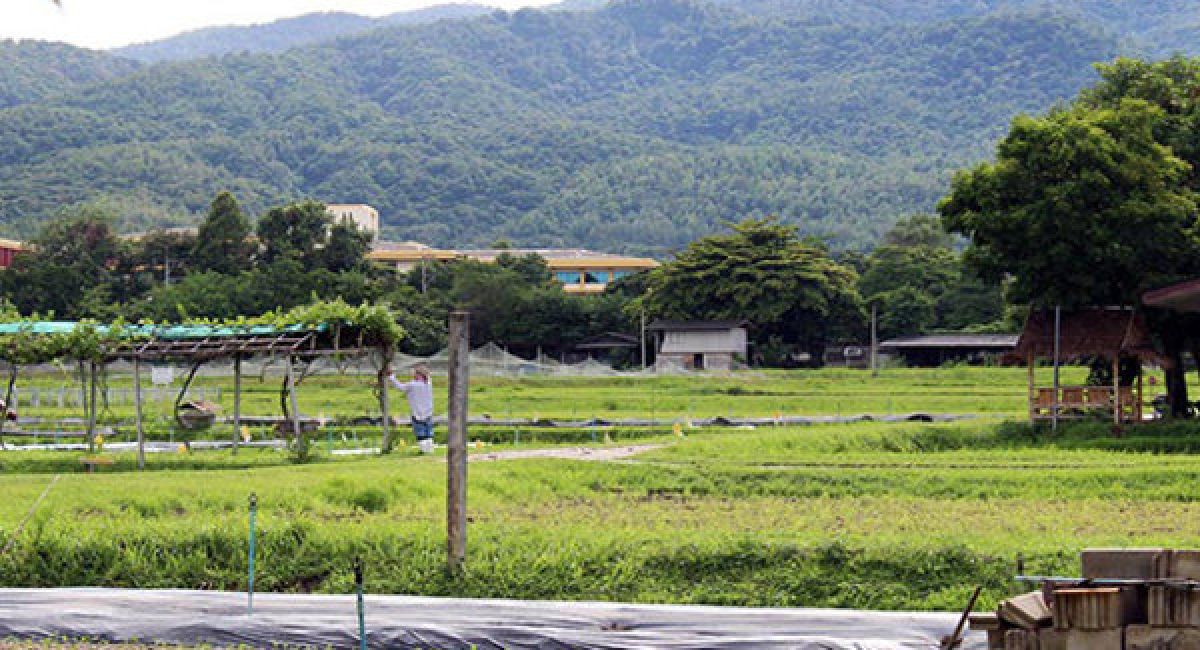
Where do you come from and what are you doing nowadays?
My wife, Nancy, and I are originally from Canada where I taught Mathematics and Chemistry for many years. A year of teaching in Scotland also was thrown into the mix somewhere along the way. Six years ago, I received a phone call in the middle of a Canadian winter asking if I wanted to teach Science in China. I was in the process of trying to find work overseas for the following school year so there was no hesitation in agreeing to take the position in Wuhan, China. Within three weeks, we had sold all our "stuff", packed up and moved from a town with a population of 5000 to a city of 10 million! I spent an amazing six years in Wuhan, teaching Mathematics at a large international school. It was, by far, six of the best years of my teaching career.
During our time there, we had lots of opportunity to travel throughout Asia, and fell in love with the mosaic of cultures that make up this part of the world. We traveled throughout Thailand on numerous occasions and enjoyed the laid-back culture and blend of old and new, especially in the northern areas of the country. Compared to our noisy, booming city life in Wuhan, Chiangmai was an oasis of tranquility. During the summer of 2013, we packed up and moved to Chiangmai.
Why did you choose to expatriate to Thailand?
Because of my age, 62, I was no longer allowed to continue at the school at the end of the 2012-2013 school year. It was partially because of China and partially because of the school itself, which had several locations around the country in different provinces. However, suffice it to say that I had a choice of retiring or looking for work elsewhere. I really didn't want to start again somewhere else at my age and retirement looked pretty enticing after more than thirty years in the classroom. So, after a lot of research, we chose the historic walled city of Chiangmai as a place to at least settle down for now. Whether we stay here forever remains to be seen.
How long has it been since you moved to Chiang Mai?
Although we have visited numerous times, we have only been living here full-time for the last year. Because we had lived in China for the last six years, it wasn't really a big culture shock to move here. It has been a long time since we have resided in the western world. We are about a fifteen-minute walk from the old city center and the bustling tourist area. In the other direction, it only takes about fifteen minutes to drive to the countryside from where we live so it is a really convenient location.
Was it difficult to settle there in terms of procedures?

My situation was very specific, as I went through the process of obtaining a "retirement visa". We both came into the country as tourists and received our 30-day passport stamp at the airport as we entered. In hindsight, it would have been much better to apply for actual Tourist Visas or Non-Immigrant Visas before we moved here. With all the paperwork in tow, we went to the local immigration office a couple of days after we arrived to obtain our Non-Immigrant-O Visas. This is the first step in obtaining a retirement visa. I had no problem and, a couple of hours later, walked out with my Non-Immigrant Visa. 90 days later, this was converted to a long-term retirement visa.
Are you working in Thailand?
One of the downsides of retiring in Thailand is that you are not allowed to work. A retiree must depend solely on his/her pension and/or savings. This is different than retirement agreements with other countries. Some people do work under the table but if caught can face fines or deportation, depending on the circumstances.
What about accommodation?
Finding housing in Thailand is not difficult. Deciding on which place to choose is. Basically, a person has to decide between an apartment, a house and a condominium. There are many of each available, with a price range that matches the accommodation, from a few hundred to many thousand baht per month. For the most part, you can find almost anything you want, if you are willing to spend the money.
The last time we visited Chiangmai, we made a point of contacting a couple of real-estate agents and having a look at the various types of properties and price ranges available in the city. We recently decided to move into a traditional Thai house on a large property.
What are the different steps for a Canadian citizen to follow to be able to retire in Thailand?
It is fairly easy to obtain a Retirement Visa if you can satisfy the financial requirements. First of all, you need to obtain a Non-Immigrant Visa which is good for 90 days. (this can be obtained almost as soon as you arrive in the country). You fave to fulfill the following requirements: passport, must be holding nationality or permanent residence of the country of application, proof of funds. Afterwards, a one year Retirement Visa can be granted after holding a Non-Immigrant Visa for 90 days. Requirements are the following: you must be 50 years old and above, passport (signed copies of each page), non-Immigrant Visa, departure Card TM.6, proof of meeting financial requirements, Thai bank book (original), a letter from your Thai bank, 3 4×5 cm photos, with full face taken. You are also required to report to the Immigration Police every 90 days if you are on a long-term extension of stay.
What are the differences between life in Canada and life in Thailand?

There are way too many to list here. Other than the obvious, such as the lower cost of living and the warm climate, the biggest difference we see in Thailand is the laid-back attitude of the people. There is no sense of urgency at any time. Nobody seems to be rushing to get anywhere (except the tourists!) and time begins to slow down. At the same time, there is an energy that seems to permeate all these different Asian cultures we have experienced. The neighborhood comes alive at six in the morning with all the street vendors beginning to set up and offer breakfast goodies. Again, at night, the streets are alive with people crammed into small curbside eateries and bars.
What surprised you most on your arrival in Chiang Mai?
Something that we didn't really know about was the number of great parks and hiking trails within a short distance of the city. Before we moved here, we had spent most of our time touring the many sites within the city itself. Now we have come to learn about the many wonderful waterfalls, nature walks and outdoor activities within a short distance of the main city. The other nice surprise was discovering the Chiangmai Expats Club which has a host of other interest groups under its umbrella that meet on a regular basis.
How long have you taken to get along with the Thai lifestyle?
We have just recently moved here and have already adapted to our new lifestyle. It wasn't really a big change since we had been living in China for the last six years. I also have to say that because I am retired, there is no adjustment to the new workplace that needs to happen. My favorite expression over the years has been, "It just doesn't matter!" and apparently this is the national Thai slogan, so I should fit in just fine.
What has motivated you to start your own blog? How does it help?
I started blogging while we lived in China mainly to provide friends and relatives with information about our travels and life abroad. Now it is fun to have readers from all over the world asking questions about living and retiring abroad. We have made several interesting connections as a result of Chinacanuck which have given us more insight into Chiangmai and Thailand.
Any advice you would like to give to soon-to-be expatriates in Thailand?
When moving overseas to any country, Thailand included, you need to be prepared to be flexible and not expect the same experiences as you had in your home country. You are the visitor; you are not going to change the culture you have moved into. I always recommend learning as much of the language as possible as soon as you can. It will give you a much better understanding of the people and they will appreciate your efforts. You read a lot about how inexpensive it is. This is only true if you live like a local person.
What are your plans for the future?
For now, we plan on staying in Chiangmai for the foreseeable future. We have had a great first year and look forward to many more. When we are not exploring the city and beyond, I spend most of my time designing and building for virtual worlds, both for those that exist now and others that are in the development stages.



















